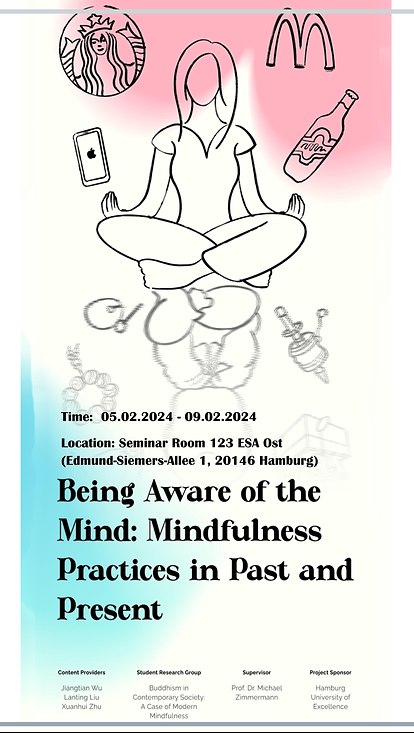Buddhism in Contemporary Society: A Case of Modern Mindfulness
February 2024 update: Exhibition and MBSR experience course

Exhibition
The exhibition presents the result of one-year academic research and fieldwork, with a focus on two main forms of mindfulness practices popular in Europe and their interconnectedness with and essential difference from traditional Buddhist mindfulness. The student research team would like to invite all who are interested to join! (The exhibition is open for visits throughout weekdays when the building is open.)
Free MBSR experience course
In addition, a free-of-charge MBSR experience course will be held in Room 117 at the Abteilung für Kultur und Geschichte Indiens und Tibets on Feb. 16th, 2024. Those who are interested in gaining first-hand experience with mindfulness practices can sign up via the QR code on the event poster. Successful registration will be informed via email before the event. The places (around 6-7) will be assigned according to first-come-first-serve principle.
The event poster with the QR code can be seen and downloaded here.
The Student Project

As part of the Excellence Strategy, Universität Hamburg supports students in tackling their own research projects during their studies and gaining early qualifications in research-based learning. Students at Universität Hamburg in Bachelor's, Master's and state examination courses can apply in teams of at least two people whose research projects with a maximum duration of 12 months in the form of materials such as material costs (specialist literature and software, small devices), travel expenses, research purposes and conference fees (also for digital conferences) can be funded.
Ms. Xuanhui Zhu, Ms. Lanting Liu (Master's students in Buddhist Studies) and Mr. Jiangtian Wu (Bachelor's student in Languages and Cultures of India and Tibet) applied for a grant with the project Buddhism in Contemporary Society: A Case of Modern Mindfulness, which has now been approved. As part of the funding project, the students will address the following questions from the perspective of Buddhist teachings and traditions: "What is mindfulness really? What allows it to attract innumerable advocates all over the world, including Germany, where the cultural and religious settings are completely different? What modern spiritual needs does the popularity of mindfulness reflect?"
